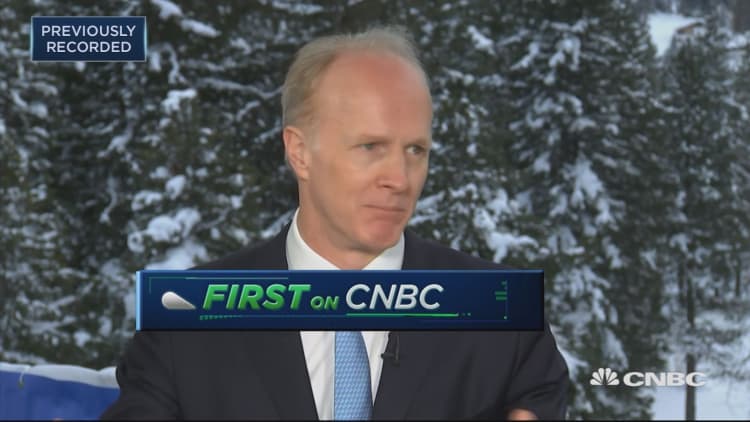
Investment strategies involving China are coming under scrutiny amid political and security-related conflicts between Beijing and major Western economies, as well as a predicted growth slowdown for the world's second-largest economy.
But Canada's massive pension fund, among the world's top 10 in terms of size, is sticking to plans to expand its holdings there.
Mark Machin, president and chief executive of Canada's Pension Plan Investment Board (CPPIB), sees the country's potential to diversify his portfolio as outweighing any shorter-term economic setbacks.
"China is today the second-largest economy in the world, the second-largest equity market in the world, the third-largest bond market in world, and we have the ability to diversify into it," he told CNBC at the World Economic Forum in Davos.
"So it's more of a diversification call than a market call for the next few weeks or months ... It's much longer-term and it's about diversification."
China's growth outlook has been dampened by weakened domestic demand and the trade war with Washington that's hit exports. A recent Reuters poll found that the country's growth is expected to slow to 6.3 percent this year from an expected 6.6 percent in 2018, which would be the lowest in 29 years. That figure was 6.9 percent in 2017.
The CPPIB, with $280 billion in assets under management as of last summer, plans to more than double its assets allocated to China by 2025 from a current 7.6 percent of its portfolio to up to 20 percent, it announced last August.
Huawei controversies
Machin admitted to the rising difficulties brought about by tensions between the U.S. and China that have spilled over to Canada. In December, Canadian authorities arrested Huawei Technologies Co. Chief Financial Officer Meng Wanzhou at the request of the U.S., as Washington pursues the executive's extradition on charges of fraud and sanctions evasion. Since then, 13 Canadian nationals have been detained in China, authorities in Ottawa said at the start of January.
Canada is also weighing banning Huawei equipment from use in the rollout of Canada's 5G next-generation wireless network on the basis of national security concerns, which Huawei denies. For Machin, these disputes — but in particular the U.S.-China trade spat — are not helpful.
"One of the things we're seeing is not just the first-order impact of that tension but the second, third, fourth order and it's rippling through the world and everything is slowing down now," Machin lamented.
On Monday, the International Monetary Fund downgraded its global growth forecast to the slowest pace in three years, citing slowdowns in Europe but highlighting the trade war and uncertainty over Brexit. The IMF's World Economic Outlook lowered growth estimates for 2019 by 0.2 percent to 3.5 percent, the second downward revision in three months.
"It's not helpful to have these tensions going on and I hope they are quickly resolved and we go on with normal trade relations, normal investment relations," Machin said.






